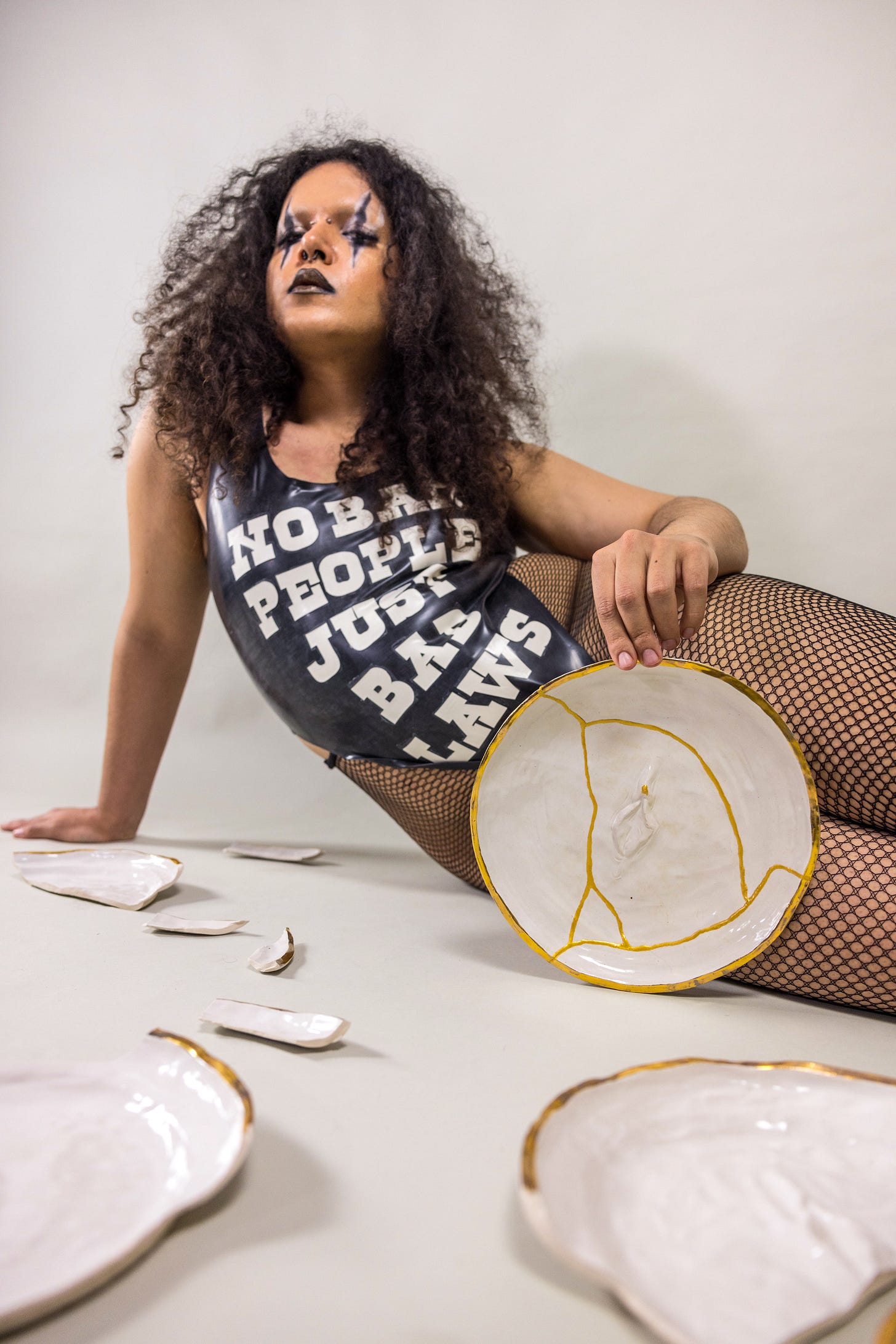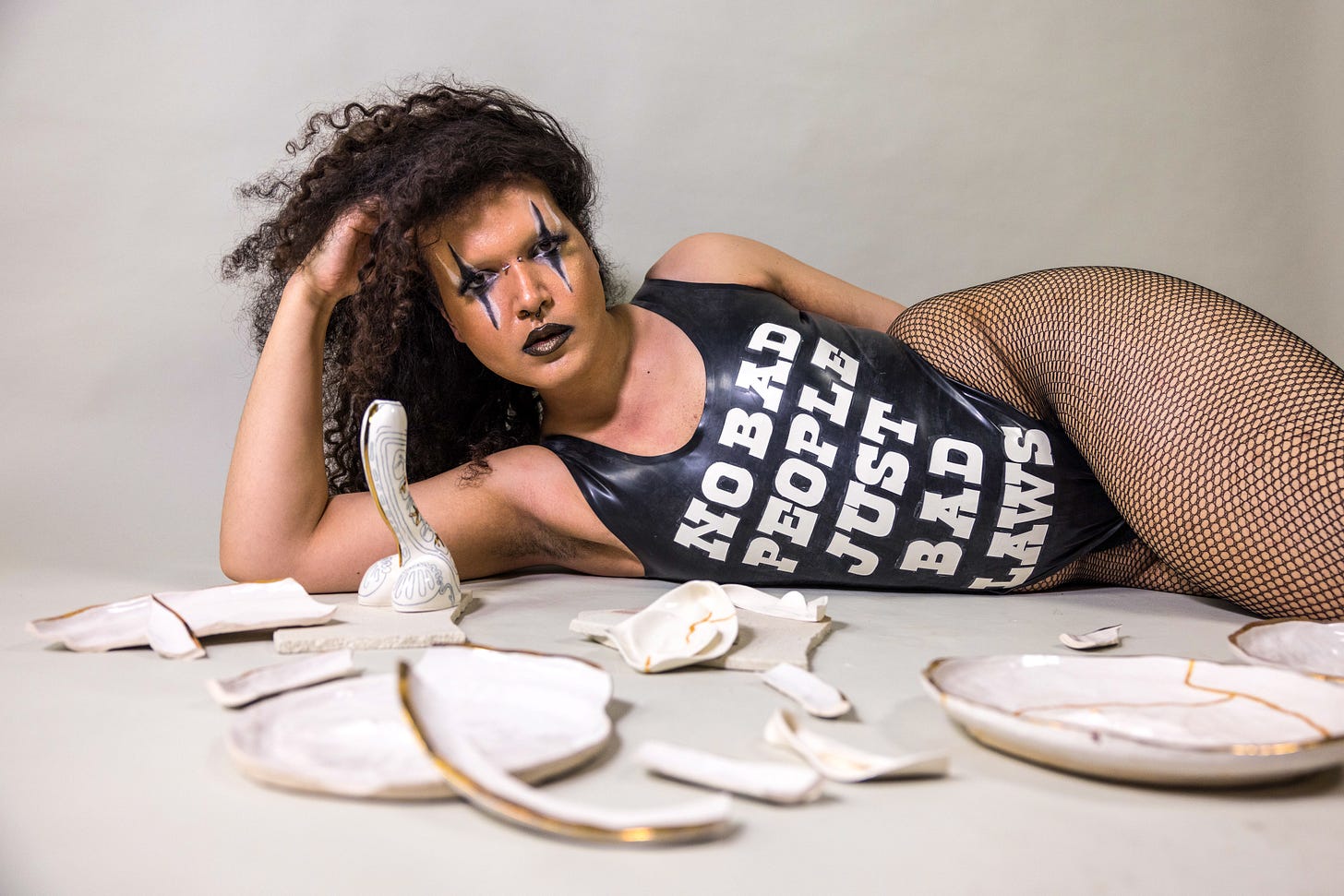Last week we became a cautionary tale. After getting our main account of 30k followers back, it was suspended again after just two weeks. The next day, we posted a reel to our backup account of 6.5k and went more viral than ever before. Normally, our posts on our main account reach around 15-30k, but now we’re reaching 4.2m people. We were thrilled to be so irrepressibly popular, until the backup account was bombarded with video chat requests and unsolicited dick pics. Our backup following more than doubled, but the new followers found Hani’s CV online and for days she was woken up by men calling her personal mobile. We wanted to rebuild our following and recover our sales, but we didn’t want this. The phrase “be careful what you wish for, lest it come true” originated in Aesop’s fables, but this message felt crueller and more misogynistic: you asked for it.
For the first eight years of Gashtrays, Hani experienced steady growth with a manageable level of abuse — there was the occasional unsolicited dick pic, but overall people were kind and supportive. But now, a lot of people seem to be following us for the wrong reasons. “I’d like to think maybe they’ll come to the account to objectify me but then be exposed to some valuable sex education content,” Hani says, but it’s pretty clear someone’s not listening to what you have to say when they’re sending you a picture of their dick as a hello. “It made me feel really vulnerable,” she says. “Like I was being watched but not seen.”
Dr Carolina Are, a platform governance researcher and pole dance instructor, explained that it’s likely our main account was suspended for ‘implicit solicitation’ – pairing a sexually suggestive element, such as a risqué pose, with a request for contact such as ‘click the link in my bio’. We’re always using social media to link to our webshop or newsletter, and Instagram’s community guidelines say that nudity in paintings and sculptures is permissible. “The issue is we’re not privy to Meta’s understanding of sexually suggestive elements,” Dr Are says. “A lot of what they deem to be sexually suggestive poses are actually just poses featuring women, so it’s very difficult to judge.”
Judging from the attention our posts have been getting on our backup account, it’s also likely that our main account has been shadow banned. This is a subtle form of censorship where our content isn’t shown to users who don’t already follow us, limiting the reach and searchability of our account. Instagram has recently started letting users check whether they have been shadow banned and allowing them to appeal the decision. “It shows how much Meta has been lying,” Dr Are says. “Before, they denied that shadow banning was even real.” One flagged post can still shadowban a whole account, and the algorithm can flag the same post repeatedly even after a successful appeal.
In recent years, legislation has pushed online platforms to become more trigger happy with censoring nudity and sexual expression. FOSTA/SESTA, a set of US laws which made website owners liable for sex trafficking content posted on their platforms, were passed in 2018. “It sounds like a great thing, but actually they lumped in sex trafficking – which is a crime – with sex work, which is a job,” Dr Are says. “Since social media platforms work with machine learning, they’ve just been censoring absolutely anything featuring bodies, particularly women and LGBTQ+ people’s bodies, to avoid getting in trouble.”
FOSTA/SESTA has endangered sex workers’ lives by pushing them offline. Internet platforms allow sex workers to work inside rather than on the streets, and enable them to screen clients and work independently of managers or agencies who could be exploitative. Ironically, FOSTA/SESTA has also made it harder to track down sex traffickers. The forthcoming Online Safety Bill in the UK has similarly been criticised for criminalising the online advertising of sex work. “I think we have to accept that some people are not going to think warmly of sex work, and to be fair, that’s their opinion,” Black Venus, founder of sex worker activist organisation Sex and Rage, says. “But people’s inability to think neutrally about sex work is really what’s stopping legislation that will support and protect sex workers and clients.”
From its inception the Internet has facilitated our sexual expression, and technological advancements like live streaming services and online payments were originally pioneered by the porn industry. Efforts to stamp out sex on the Internet are also nothing new: in the 1970s and 80s feminist activists and evangelical Christians engaged in activism and legal efforts to ban pornography. However, these efforts failed on the basis that sexual expression is a protected right. Now, law professor Julie Dahlstrom argues a “new pornography wars”, again linked to evangelist groups, has erupted under the guise of anti-trafficking law. “We need to have some kind of accountability online, because bad things can happen to sex workers,” Black Venus says. But the reforms shouldn’t harm those they’re supposed to protect, or suppress everyone’s sexual expression online.
Social media can be designed differently: Lips.social, a community-designed social media platform run by a collective of sex workers, women, queer people and people of colour, allows sexual content and nudity. Unlike on Instagram, Lips users can pick which topics they would like to see and which they don’t. Every user goes through an approval process, including verifying they are over 18. Similarly, Tumblr allows users to choose not to see nudity, and OnlyFans verifies creators. However, both platforms only introduced these measures after alienating their user base by banning nudity. As long as laws like FOSTA/SESTA exist, there will be the temptation to ban sexual content instead of meeting complex and expensive moderation demands.
And it’s pretty difficult to make a living as an artist or performer without having a presence on Instagram, Facebook, or TikTok. “Social media may have been created and owned by private companies, but they perform civic space functions too – like a shopping mall, or like the mainstream media,” Dr Are writes. She argues for moderating content in line with human rights such as freedom of expression and the right to due process. Suggested measures include censoring single posts rather than whole accounts, using more human moderation, creating a proper appeals process, and letting users recover their data when their accounts are suspended.
The current draft of the UK’s Online Safety Bill only punishes unsolicited nudes sent “with harmful intent,” leaving a loophole for offenders to claim it was only a prank. And reporting a dick pic to Instagram rarely brings positive results; in fact, our account has been suspended twice after reporting them, an experience shared by other sex positive creators in our community. Reporting sexual harassment seems to draw attention to our account and attract censorship while the offending accounts are left up, despite the fact that making ceramic genitalia is not a crime and cyberflashing is one.
Creators who make sex-related content write in symbols, advertise by word of mouth, and change the gender of their accounts to ‘male’ to evade Instagram censorship. Dr Are recommends establishing contact with social media followers via email, phone or encrypted platforms like Signal, and using a backup account to preserve your network. Fans can lend their support by sharing posts to help accounts grow despite shadowbans. “When it comes to sex positive content, people may be afraid of being judged or being censored themselves, but just sharing more ‘vanilla’ posts every now and again can be really helpful,” she says.
So where does this all leave Gashtrays, now we’ve been choked by censorship and burned by exposure? Thankfully, it’s pushed us towards what we most desire: focusing on the quality of our relationships rather than the quantity. Curator and writer Yaa Adde interviewed digital doulas Olivia McKayla Ross and Neema Githere, who pioneered the concepts of data trauma and data healing. “By prioritising love over likes, data healing asks us to consider alternative metrics of engagement on social media,” Adde writes. “What shifts when we measure our impact by participating in conversations, thoughtful DMs, and the number of times something inspires joy in us?”
“We make these magic circles so that we can cope with what’s outside the circle,” McKayla Ross says. “We [craft] this second reality to cope with the wilderness.” Dutch historian Johan Huizinga coined the term ‘magic circle’ to refer to spaces where groups of people decide what rules to follow. For example, a court of law, a video game, and a funeral all have different rules of engagement. There’s a lot of talk about online bubbles being polarising and harmful to society which doesn’t reflect how healing they can be. Marginalised creators can draw strength from inside our magic circles. We can unlearn the idea that abuse is what we deserve, and collectively imagine a way the world could look different.
Our desires feel the most wonderful bathed in light, untwisted from shame. Sexual expression gives voice to the part of us that’s most craving and intuitive, which helps us carve out a sense of self beyond what society dictates. Once you feel at home in this — the throbbing, heart-racing feeling of being alive — it makes you wonder what else could be different; what other parts of ourselves are caged that could be liberated. “On a psychological level, I think authorities feel the need to suppress sex because it’s liberatory,” Black Venus says. “It leads us to question the limits of our freedom.”
If you liked this newsletter, please consider sharing it with a friend! Words by our editor Helen Gonzalez Brown @helenbr0wn, creative director Hani Dresner @gashtrays_backup, photography/videography @harveywallbanger, model @die.lemma, latex bodysuit by @aimlessgallery
To support our fellow creators, we’re starting a monthly Shadow Ban Shoutout. If your Instagram account is vulnerable to censorship, please add your handle to this Google Sheet so we can share your work on our stories, and we’d love for you to join us in sharing accounts :) All products featured in the photos are also available on our shop!








